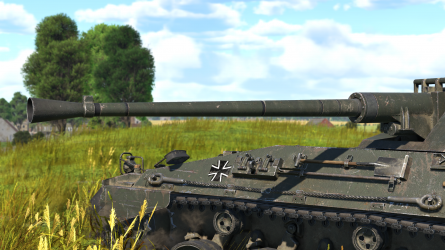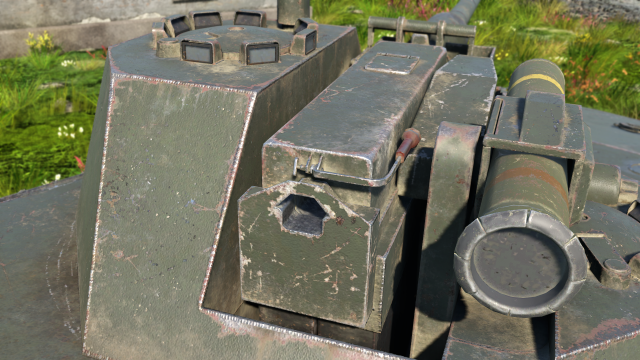Difference between revisions of "Bofors L/70 Mk.1 (57 mm)"
m (Thumbnail added. Screenshot added on 'Media' section.) |
Colok76286 (talk | contribs) (Edits) |
||
| Line 44: | Line 44: | ||
== Media == | == Media == | ||
| + | <!-- ''Excellent additions to the article would be video guides, screenshots from the game, and photos.'' --> | ||
| + | |||
;Images | ;Images | ||
| − | <gallery mode="packed-hover" | + | <gallery mode="packed-hover" heights="x250px"> |
File:Weapon Bofors L-70 Mk.1 (57 mm) breech.png|<small>The Bofors L/70 Mk.1 (57 mm) gun breech on the Begleitpanzer 57.</small> | File:Weapon Bofors L-70 Mk.1 (57 mm) breech.png|<small>The Bofors L/70 Mk.1 (57 mm) gun breech on the Begleitpanzer 57.</small> | ||
</gallery> | </gallery> | ||
Latest revision as of 04:46, 29 March 2023
Contents
Description
The 57 mm Bofors L/70 Mk.1 is a naval autocannon designed to engage both air and surface targets. It was developed form the earlier Bofors 57 mm L/60, a twin-barrel naval autocannon, basically a scaled-up version of the 40 mm Bofors L/60 Mark 1.
Vehicles equipped with this weapon
General info
Tell us about the tactical and technical characteristics of the cannon or machine gun.
Available ammunition
| Penetration statistics | |||||||
|---|---|---|---|---|---|---|---|
| Ammunition | Type of warhead |
Penetration @ 0° Angle of Attack (mm) | |||||
| 10 m | 100 m | 500 m | 1,000 m | 1,500 m | 2,000 m | ||
| 57x438 AP-T | APCBC | 137 | 133 | 119 | 102 | 89 | 77 |
| 57x438 SAP-T | SAPHEI | 47 | 46 | 41 | 35 | 31 | 26 |
| 57x438 HE-T | HE* | 16 | 15 | 13 | 11 | 11 | 11 |
| 57x438 HE-VT | HE-VT* | 16 | 15 | 13 | 11 | 11 | 11 |
| Shell details | ||||||||||||
|---|---|---|---|---|---|---|---|---|---|---|---|---|
| Ammunition | Type of warhead |
Velocity (m/s) |
Projectile mass (kg) |
Fuse delay (m) |
Fuse sensitivity (mm) |
Explosive mass (TNT equivalent) (g) |
Ricochet | |||||
| 0% | 50% | 100% | ||||||||||
| 57x438 AP-T | APCBC | 950 | 2.7 | - | - | - | 48° | 63° | 71° | |||
| 57x438 SAP-T | SAPHEI | 950 | 2.7 | 1.2 | 9 | 510 | 79° | 80° | 81° | |||
| 57x438 HE-T | HE* | 1,020 | 2.4 | 0.4 | 0.1 | 765 | 79° | 80° | 81° | |||
| Proximity-fused shell details | ||||||||||||
|---|---|---|---|---|---|---|---|---|---|---|---|---|
| Ammunition | Type of warhead |
Velocity (m/s) |
Projectile mass (kg) |
Fuse delay (m) |
Fuse sensitivity (mm) |
Arming distance (m) |
Trigger radius (m) |
Explosive mass (TNT equivalent) (g) |
Ricochet | |||
| 0% | 50% | 100% | ||||||||||
| 57x438 HE-VT | HE-VT* | 1,020 | 2.4 | 0.2 | 0.1 | 500 | 6 | 765 | 79° | 80° | 81° | |
Comparison with analogues
Give a comparative description of cannons/machine guns that have firepower equal to this weapon.
Usage in battles
The 57 mm Bofors L/70 cannon will face MBTs and heavy tanks, but it can still make work of its capabilities. When dealing with other ground units, the key here is to be on the flank of the enemy as most side armour of MBTs, NATO and Soviet can be pierced with the 57 mm AP rounds. As the 57 mm does not have an explosive filler with its AP shell, and SAPHEI being near useless, the cannon requires to aim at key components such as ammo rack or general area where the crew sits. With your high rate of fire rate, you can disable most targets and not worry where to aim for the most part with the APCBC shell. Although the 57 mm has access to SAPHEI and can overpressure enemies, it's mainly only effective against lightly-armoured vehicles.
Against aircraft, HE-VT is very effective, having a good velocity and damage to disable targets. Helicopters will stand no chance against the 57 mm once they are spotted, and a few volleys of HE-VT will heavily damage them at least to hinder their combat capabilities. Against jets and other aircraft, the 57 mm has just enough rate of fire to disable jet aircraft, though you will have to lead more the faster they are.
Pros and cons
Pros:
- Good rate of fire for its calibre
- Good anti-tank capabilities with the APCBC
- Access to HE-VT shells
Cons:
- SAPHEI is near useless except on light vehicles
- No APFSDS unlike its 40 mm variant
History
Examine the history of the creation and combat usage of the weapon in more detail than in the introduction. If the historical reference turns out to be too long, take it to a separate article, taking a link to the article about the weapon and adding a block "/History" (example: https://wiki.warthunder.com/(Weapon-name)/History) and add a link to it here using the main template. Be sure to reference text and sources by using <ref></ref>, as well as adding them at the end of the article with <references />.
Media
- Images
See also
External links
Paste links to sources and external resources, such as:
- topic on the official game forum;
- other literature.
| Germany tank cannons | |
|---|---|
| 20 mm | KwK30 · KwK38 · Rh202 |
| 28/20 mm | s.Pz.B.41 |
| 30 mm | MK 30-2/ABM |
| 37 mm | KwK34(t) · KwK36 · KwK38(t) · PaK L/45 |
| 47 mm | Pak.(t)(Sf.) |
| 50 mm | KwK39 · KwK L/42 · PaK38 |
| 57 mm | Bofors L/70 Mk.1 |
| 75 mm | K51 L/24 · KwK37 · KwK40 L43 · KwK40 L48 · KwK42 · KwK44 · KwK44 L/36.5 · PaK39 L48 · PaK40/3 L46 · PaK42 · StuK37 · StuK40 L43 · StuK40 L48 |
| 76 mm | PaK36 (r) |
| 88 mm | Flak.37 · Flak 41 · KwK36 · KwK43 · PaK43 |
| 90 mm | BK90 |
| 105 mm | CN105-57 · Cockerill HP · FMK.4 Modelo 1L · K.18 · KwK L/68 · L7A3 · PzK M57 · StuH42 |
| 120 mm | Rh120 L/44 · Rh120 L/55 · Rh120 L/55 A1 |
| 128 mm | K.40 · KwK44 · PaK44 |
| 150 mm | s.I.G.33 · Stu.H 43 L/12 |
| 380 mm | RW61 |
| Foreign: | |
| 30 mm | Bushmaster 2 Mk.44 (USA) · HSS 831L (Britain) |
| 57 mm | 6pdr OQF Mk.V (Britain) |
| 73 mm | 2A28 (USSR) |
| 75 mm | M3 (USA) |
| 76 mm | F-32 (USSR) · F-34 (USSR) · M32 (USA) |
| 90 mm | M36 (USA) · M41 (USA) |
| 105 mm | GT-3 (South Africa) |
| 125 mm | 2A46 (USSR) |
| 152 mm | M-10T (USSR) · XM150E5 (USA) |
| 155 mm | M126 (USA) |





